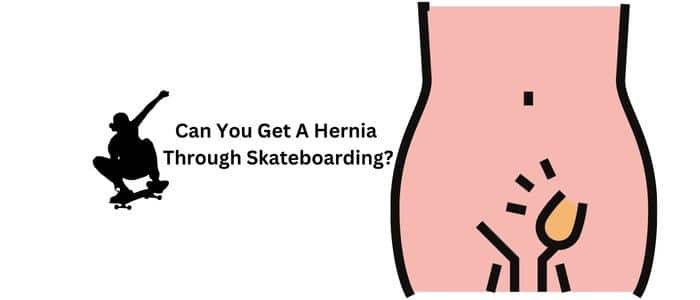Can You Get a Hernia from Skateboarding?
( If you purchase through our sponsored links, we may receive a small commission at no extra cost to you )
A hernia is when an organ or tissue protrudes through a weak spot in the muscle or surrounding connective tissue. Hernias can happen anywhere in your body, but they’re most common in the abdomen. A hernia isn’t necessarily painful, but it can cause discomfort and be unsightly.
You might be wondering, “Can you get a hernia from skateboarding?” The answer is yes, you can get a hernia from skateboarding (or any other activity that puts strain on your abdominal muscles). If you have a pre-existing condition that makes you more susceptible to hernias, such as a connective tissue disorder, you’re at an even greater risk.
- Get on your skateboard and head to your local skate park
- Find a good spot to drop in and start skating around
- After a few minutes of skating, stop and take a rest
- When you’re ready, start doing some tricks on your board
- After awhile of doing tricks, you may feel a sharp pain in your groin area
- This is a hernia developing from the strain on your muscles
- If the pain persists, stop skating and seek medical attention immediately as this could be a serious condition
Can You Get a Hernia from Skating?
A hernia is a protrusion of an organ or the tissue that surrounds it through a weak spot in the muscle or connective tissue that holds it in place. Though uncommon, hernias can occur as a result of physical activity, like skating.
There are two main types of hernias that can occur from skating: abdominal and inguinal.
Abdominal hernias are more rare and tend to happen when there is sudden abdominal trauma, like a hard fall on the ice. This type of hernia can be serious because it can cause internal organs to become damaged or even rupture. Inguinal hernias are more common and occur when there is repetitive strain on the muscles and connective tissue in the groin area.
This type of hernia is not as serious as an abdominal hernia but can still be painful and require medical attention.
If you think you may have a hernia, it’s important to see a doctor right away so they can diagnose and treat the condition. Hernias cannot heal on their own and will only get worse over time if left untreated.
Skating should not make your hernia worse, but avoid any strenuous activity until you’ve seen a doctor just to be safe.
Do Sports Hernias Go Away?
A sports hernia is a type of groin injury that most often affects athletes. The condition is caused by a tear in the muscles or tendons in the lower abdomen and groin area. Symptoms of a sports hernia include pain in the groin area, weakness in the legs, and difficulty moving the hips or legs.
Treatment for a sports hernia typically involves rest, ice, and over-the-counter pain medication. In some cases, surgery may be necessary to repair the tear.
What Does Sports Hernia Feel Like?
A sports hernia is a type of abdominal injury that can cause immense pain in the groin area. This condition is often caused by overexertion or repetitive motions and can be difficult to diagnose. Treatment typically involves rest, ice, and pain relief medication.
In severe cases, surgery may be necessary.
The most common symptom of a sports hernia is pain in the groin area. This pain may radiate into the lower abdomen or testicles and can become worse with activity.
Other symptoms include weakness in the affected leg, difficulty urinating, and swelling in the groin area.
If you suspect you may have a sports hernia, it is important to see your doctor as soon as possible for an accurate diagnosis. Treatment will vary depending on the severity of your injury but typically includes rest, ice, and pain relief medication.
Surgery may be necessary in severe cases where other treatments have failed to provide relief.
Do Athletes Get Hernias?
An athlete is someone who participates in physical activity with the intention of becoming physically fit, or improving their performance in a chosen sport. Hernias can occur in athletes, but they are not as common as some other injuries.
There are three main types of hernias that can affect athletes: inguinal, femoral and umbilical.
An inguinal hernia occurs when a portion of the intestine protrudes through a weak spot in the abdominal wall. This type of hernia is more common in men than women. A femoral hernia occurs when a portion of the intestine protrudes through a weak spot in the groin area.
This type of hernia is more common in women than men. An umbilical hernia occurs when a portion of the intestine protrudes through the navel (belly button). Umbilical hernias are more common in infants and young children, but they can also occur in adults.
Athletes may be at increased risk for developing hernias because of the repetitive stress placed on their bodies during training and competition. However, most hernias occur spontaneously and are not related to any specific injury or event.
If an athlete does develop a hernia, it is important to seek medical attention immediately.
If left untreated, a hernia can become strangulated, which means that the blood supply to the affected area is cut off. Strangulation is a serious medical emergency that requires surgery to correct.
Is Skateboarding Good Exercise
Skateboarding is definitely a good workout! It’s great for cardio and works your legs, core, and arms. Plus, it’s a low-impact activity, so it’s easy on your joints.
And skateboarding can be done almost anywhere – on the street, in the park, or even in your driveway.
So if you’re looking for a fun way to get some exercise, skateboarding is definitely worth considering. Just be sure to wear proper safety gear (helmet, elbow pads, knee pads) to help prevent injuries.
Conclusion
Hernias can occur when there is a weak spot in the abdominal wall and an organ or tissue pushes through. Skateboarding puts strain on the abdomen and can cause a hernia. However, most hernias are not caused by skateboarding.


![12 Best Skateboard Books In 2023 [Must Read & Listen!]](https://sportstotry.com/wp-content/uploads/2020/02/SKATEBOARDING-BOOKS.jpg)

![Top 7 Best Skateboards Under 50 Dollars [Cheap but Good in Quality]](https://sportstotry.com/wp-content/uploads/2021/06/Best-Skateboard-Under-50.jpg)
![How To Clean Skateboard Wheels [Easy 9 Steps & Tips]](https://sportstotry.com/wp-content/uploads/2020/07/How-To-Clean-Skateboard-Wheels-1.jpg)

![Strongest Skateboard Decks in 2023 [Durable, Lightweight & Flexible!]](https://sportstotry.com/wp-content/uploads/2021/03/strongest-skateboard-deck-1.jpg)